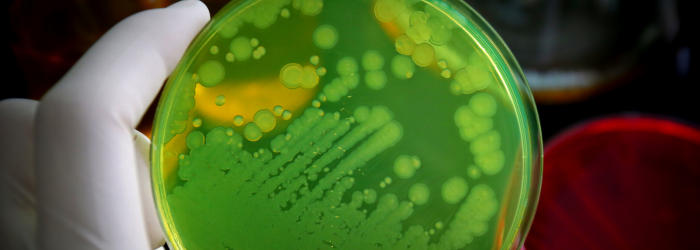
In the Don Whitley Scientific Microbiology Laboratory, we routinely perform minimal inhibitory concentration (MIC) testing of antimicrobial agents, so it is imperative that our expert microbiologists keep up-to-date with the latest developments in scientific research in this area. DWS Microbiologist, Kirsty McTear, conducted a review of the latest MIC research, exploring the antibacterial effects of clove essential oil against six multidrug-resistant Pseudomonas aeruginosa strains. This included the impact on protease production and key virulence gene expression, which is crucial for biofilm formation.
National statistics show that from 2022 to 2023 there was over a 1.5% increase in infectious P. aeruginosa cases across UK hospitals; while the rise may seem minor, a main cause is antimicrobial resistance (AMR), which for decades, has been and continues to be a global threat, so tackling AMR for P. aeruginosa infections is primal [1].

Scientists are eagerly attempting to tackle AMR and identify new avenues of antimicrobial treatments, including the use of essential oils – more specifically, clove essential oil [2]. Previous research identified clove oil as a promising antimicrobial agent, so Awad et al. explored this notion further by determining the MIC of clove oil against six P. aeruginosa strains [2]. Isolated from Syzygium aromaticum flower buds, the clove essential oil was tested against strains isolated from wound infections of patients and using the broth microdilution methodology, a common method used at the DWS laboratory, MIC values were determined [2]. The MICs for each strain ranged from 0.006 mg/mL to 0.090 mg/mL and clove oil was found to reduce the expression of pelF and aprA, which are the two virulence genes that encode biofilm formation and protease production [2]. These results suggest that clove essential oil, or its components, may have potential as a treatment for P. aeruginosa infections – both as an antimicrobial agent and as a moderator of virulence factors [2].
Such valuable research could suggest that other essential oils may also have this antimicrobial effect and provides other AMR researchers with a baseline for research, including looking into the specific components of clove essential oil and the mechanism behind its advantageous effects.
Want to read more about the beneficial effects of essential oils? Here is an article on the antioxidative effects of essential oils on kidney cells.
Sign up to our Microbiology Services & Hot Topics newsletter
References
- Agency UHS. Pseudomonas aeruginosa bacteraemia: Annual data [Internet]. GOV.UK; 2023 [cited 2024 May 30]. Available from: https://www.gov.uk/government/statistics/pseudomonas-aeruginosa-p-aeruginosa-bacteraemia-annual-data
- The effect of sub-inhibitory concentration of clove essential oil on the expression of pseudomonas aeruginosa virulence genes. Tropical Journal of Natural Product Research. 2024 Mar 30;8(3). doi:10.26538/tjnpr/v8i3.4


 en
en


 English
English